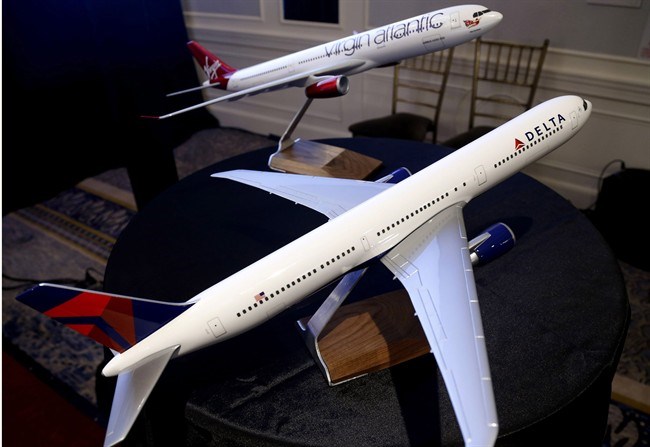Delta Air Lines is grabbing a bigger share of the world's most important travel route: New York to London.
The airline is paying $360 million for almost half of Virgin Atlantic, the swanky airline founded by Sir Richard Branson in 1984 as a cheaper and more stylish way to fly between the U.S. and London.
Business travellers are hungry for flights on that route and Delta has been missing out. With this deal, Delta is buying its way into that market.
The carrier's 49-per cent stake in Virgin Atlantic was held by Singapore Airlines, which paid $960 million for it in 2000.
For travellers, the deal means more seamless connections on flights from inside the U.S. to the U.K. Frequent fliers will soon be able earn and redeem miles on either carrier. Finally, some Delta travellers will get access to Virgin Atlantic's well-regarded airport lounges.
Delta has just three flights a day from New York to London's Heathrow Airport. That's not enough for an airline that is aiming to dominate New York travel. Together with Virgin Atlantic, it would have nine flights a day.
American Airlines and British Airways have a combined 14 flights a day from New York to Heathrow.
"Delta will now be credible from NYC to London," wrote J.P. Morgan airline analyst Jamie Baker.
He said Delta has about 10 per cent of New York-to-London business now. The deal would give Delta and Virgin a combined 38 per cent share, he wrote. That compares with 49 per cent for the American-British Airways venture and 11 per cent for United Airlines and its partners.
Regulators in the U.K. and U.S. still need to approve the Delta-Virgin venture, but in 2010 they approved the larger venture between American and British Airways.
Delta is aiming to have the joint operation running by the end of 2013.
Delta can't simply add flights to Heathrow because capacity there is limited. And the Virgin deal, by itself, won't put more planes at Heathrow. But Delta CEO Richard Anderson said he expects to maximize Delta and Virgin's landing rights in ways that help both of them.
Virgin Atlantic will benefit because Delta will funnel passengers from around the U.S. onto Virgin Atlantic planes headed to London.
"I look forward to working with Richard Anderson and his team and continuing to give the rest of the industry a true run for its money," Branson said by a video link shown at the Delta-Virgin press conference in New York.
Branson will still own more than half of Virgin Atlantic, and the carrier will continue to fly as a separate airline under its own name.
Virgin Atlantic has been struggling. It reported a pretax operating loss of 80.2 million British pounds in its most recent fiscal year, even as the number of passengers it carried rose 2 per cent. It indicated in 2010 that it might be interested in some kind of tie-up with another airline. British media reports at that time said that Delta was interested.
Delta's Anderson estimated that U.S. business travellers spend some $2 billion a year flying between New York and London Heathrow.
By attracting more business travellers flying between New York and London, the deal could bring Delta hundreds of millions of dollars in added revenue starting in 2014, estimated Buckingham Research analyst Daniel McKenzie. Some of that business will probably come at American's expense, McKenzie wrote.
Delta has made several moves in recent years to expand its route map.
One of the attractions of its 2008 purchase of Northwest Airlines was Northwest's extensive Asia network. Delta paid $65 million in August 2011 for a stake in Grupo Aeromexico. It was part of a deal to expand their existing commercial alliance by linking each other's passenger networks. And in December 2011 Delta invested $100 million in GOL, Brazil's second-largest airline.
Shares of Atlanta-based Delta Air Lines Inc. rose 52 cents, or 5.1 per cent, to close at $10.66.
___
Associated Press Writer Robert Barr in London contributed to this report.


